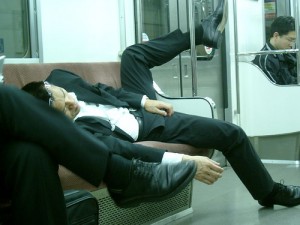Everyday on news, I hear something harassment in Japan. I am wondering what harassment is going on in Japan. I listed some of funny and interesting harassment in Japan.
Surprisingly, there are new types of harassment in Japan defined everyday and these are usually Wasei-Eigo (Japanese-made English), and coined word which are abbreviated into “○○ハラ”. On my previous post, I have showed about basic rules of Japanese abbreviated word. http://www.dicethekamikaze.com/blog/jp-language/japanese-abbreviated-words/
This something harassment words follows rule 1.
foreign compound nouns that each words has 2 or 3 syllables abbreviated to one word combined with first two morae in each word.
When you hear these terms on Japanese TV news and shows, it says something about harassment; however, there are new types of harassment defined in Japan. It seems that the word ‘harassment’ has lots of meaning in Japan which includes, “harassment”, “discrimination against”, and “causing trouble”.
New types of harassment
Last year, 2014, “harassment for pregnancy” (pregnancy discrimination) a.k.a “maternity harassment” (matahara マタハラ) was nominated to the 10 vogue words of 2014. http://www.dicethekamikaze.com/blog/jp-culture/japanese-vogue-words-2014/
New types of harassment often demonstrate changes of Japanese society both positively and negatively. For example, in Japanese society, male chauvinism is still deep rooted, but this “maternity harassment” represents the rights of female workers in business, and decline of male chauvinism in Japanese society. Moreover, negative example is that sometimes the new definition of harassment are overexaggerated to accuse certain group of people.
According to wikipedia, definition of harassment is
it is intentional behaviour which is found threatening or disturbing.
However, some people are very sensitive about harassment and abuse to use the word harassment for everything they feel uncomfortable. New types of harassment defined in Japan, sometimes the term “intentional behaviour” are neglected and turned into wrong use of the word, which happen very often in borrowing words.
Harassment in Japanese work place is very sensitive to talk about.
List of harassment in Japan.
| Name | abbreviated word | meaning |
|---|---|---|
| パワーハラスメントpower harassment | パワハラpawa hara | Bullying and illegal discrimination against someone lower statuses or politically abuse of power in workplaces.This term is usually used to your boss. |
| セクシャルハラスメントsexual harassment | セクハラseku hara | sexual harassment |
| ジェンダー・ハラスメントGender harassment | gender discrimination | |
| マタニティーハラスメントmaternity harassment | マタハラmata hara | harassment to pregnant women in workplaces. for example, showing negative attitude for taking maternity leave. |
| アルコールハラスメントalcohol harassment | アルハラaru hara | Forcing people to drink alcohol and losing control and causing trouble to someone. This is coming from my previous post “Nominication” in workplace. |
| スメルハラスメントsmell harassment | harassment to someone causing annoyance by giving strong smell. | |
| スクール(アカデミック)ハラスメントSchool(academic) harassment | Discrimination against based on your educational background or schools and college you graduated. | |
| テクノロジーハラスメントTechnology harassment | テクハラ tekuhara | harassment to people does not know much technology. For example, someone in your tech department use lots of terminology to explain the technology or looking down someone who don’t know about technology much. |
| エイジハラスメントAge harassment | harassment to middle and old age. |
I am hoping the definition and practice of accusing these harassment are working positively in workplaces and used correctly. Again, there are too much harassment in Japan.












